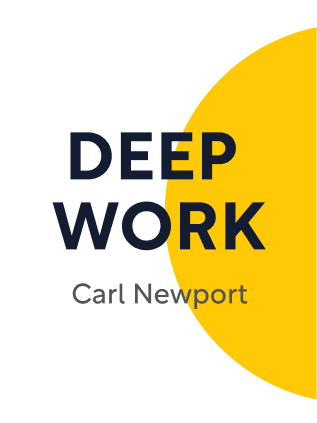Deep Work: Rules for Focused Sucess In A Distracted World | Book by Carl Newport

Newport is a professor at Georgetown University, where he specializes in the theory of distributed systems. His popular books, including “Deep Work: Rules for Focused Success in a Distracted World” and “Digital Minimalism: Choosing a Focused Life in a Noisy World,” have gained a wide readership for their practical advice on enhancing focus, productivity, and well-being in the modern digital age.
One Answer To A Lifetime Of Problems
Review By: Joel Lovely
Before:
A question arose to me as I was spending the month of May in Aluva, Kerala, with an erratic schedule and a goal of finishing a Python course called “100 Days of Code By: Angela Yu.” I struggled to make progress as my audacious goal of finishing a programming day in an actual day failed (Days 66-77 completed). I felt completely frustrated as soon as I felt my motivation and concentration levels dipping. What a month earlier seemed to be an enjoyment seemed far more stressful than ever before. So why am I not focusing?
Conclusion:
The book is divided into two parts: Part 1, “The Idea,” and Part 2, “The Rules.” In the initial stages, Carl Newport emphasizes the fundamentals of why Deep Work is crucial, claiming that this skill is increasingly difficult to develop in an era of constant distractions. He supports his argument with stories of individuals like Adam Grant, a business analyst turned computer scientist; Alissa Rubin, a reporter for the New York Times; Ric Furrer, a renowned blacksmith; and others. Newport concludes his point by examining the concept from psychological, philosophical, and neurological perspectives. The book then transitions into Part 2, which focuses on ways to enhance Deep Work. Newport encourages adopting a ritualistic approach, using significant gestures with important deadlines, and collaborating with others. He then shifts to planning and execution, suggesting the implementation of his 4DX Model and a block schedule. Finally, he concludes Part 2 by advising readers to embrace boredom and quit social media as essential to successfully implementing Deep Work.
Back to the question at hand, why am I not focusing? My answer: a confusion of responsibilities combined with a lifetime of problems that are fairly consistent. To put it in situational terms: vacation is for resting and spending time with family. Instead of stressing about failure, remember that you have your whole life ahead to solve those tedious problems. So, focus on enjoying the moments that bring meaning to your life.
This book didn’t bring much unconventional knowledge beyond what you’d find in a typical motivational book, which was disappointing. However, I do believe the concepts Newport discusses are important reminders for young adults navigating the modern world. At my lowest points, I had similar realizations about the steps toward Deep Work, but for different reasons. For example, using social media less: I believe a person should have fewer than 150 connections, in line with Dunbar’s Rule. While Newport provides another explanation that works, if you decide to read this book, experience it fully and use critical thinking to develop your own interpretations.